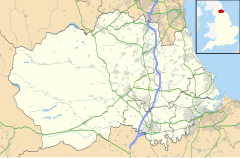Stanley, County Durham
| Stanley | |
|---|---|
 St. Andrew's Church, Stanley |
|
| Stanley shown within County Durham | |
| Population | 32,766 (2011) |
| OS grid reference | NZ197525 |
| Unitary authority | |
| Ceremonial county | |
| Region | |
| Country | England |
| Sovereign state | United Kingdom |
| Post town | STANLEY |
| Postcode district | DH9 |
| Dialling code | 01207 |
| Police | Durham |
| Fire | County Durham and Darlington |
| Ambulance | North East |
| EU Parliament | North East England |
| UK Parliament | |
| Website | http://www.stanley-tc.gov.uk |
Stanley is a former colliery town and civil parish in County Durham, England. Centred on a hilltop between Chester-le-Street and Consett, the town lies south west of Gateshead.
Stanley was formerly divided into three distinct settlements – the main town of West Stanley and the mining villages of East Stanley and South Stanley. Through a process of gradual expansion, these have become amalgamated into one town, with East and South Stanley no longer officially used as town names (although they are still recognised colloquially).
The civil parish of Stanley was created in 2007 and takes in not only Stanley, but the villages of Annfield Plain, Tanfield, Craghead, Catchgate, Tantobie, Tanfield Lea, South Moor, White-le-Head,Bloemfontein, Clough Dene, Greencroft, Harelaw, Kip Hill, The Middles, New Kyo, No Place, Oxhill, Quaking Houses, Shield Row, and West Kyo. The current Parish covers the vast majority of the former Stanley Urban District Council area, with the exception of Dipton and Burnopfield.
Stanley was first mentioned in 1211; however, some neolithic and Roman remains have been found in the area. The town's name is derived from the Old English for 'Stoney Field'.
...
Wikipedia

